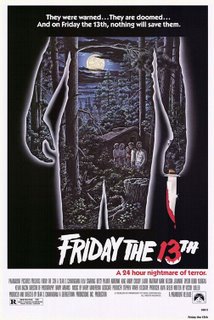friday the 13th

Ever wonder why Friday the 13th is considered an unlucky day? To me, it's always been just like any other Friday, except repeats of "Friday the 13th" on TBS and USA all night long. (Except the first flick, the entire series is trash, even if you're a horror fan, like me.)
But really, should I dodge walking under ladders or avoid opening my umbrella inside today any more than I would on the equally-as-dreadful Wednesday the 18th? Boo!
You be the judge. Here's a brief history of Friday the 13th, as excerpted from www.wikipedia.com, and don't forget to post your thoughts:
OVERVIEW
A Friday occurring on the 13th day of any month is considered to be a day of bad luck in many superstitions around the globe. Similar superstitions exist in some other traditions. In Greece and Spain, for example, Tuesday the 13th takes the same role. The fear of Friday the 13th is called paraskavedekatriaphobia, paraskevidekatriaphobia or friggatriskaidekaphobia, a specialized form of triskaidekaphobia, a phobia (fear) of the number thirteen.
ORIGINS
The origin of the Friday the 13th superstition has been linked to the belief that there were 13 people at The Last Supper of Jesus, who was crucified on Good Friday, but it probably originated in medieval times. It has also been linked to the fact that a lunisolar calendar must have 13 months in some years, while the solar Gregorian calendar and lunar Islamic calendar always have 12 months in a year. Another suggestion is that the belief originated in a Norse myth about twelve gods having a feast in Valhalla. The mischievous Loki gate-crashed the party as an uninvited 13th guest and arranged for Hod, the blind god of darkness, to throw a branch of mistletoe at Balder, the god of joy and gladness. Balder was killed instantly and the Earth was plunged into darkness and mourning as a result. Both the first and last explanations, however, seem more relevant to the superstition linked to having 13 people at the same table during a meal.
EFFECTS
Strangely, there is evidence to suggest that Friday the 13th is actually unlucky for some. Psychologists have found that some people are especially likely to have accidents or fall ill on Friday the 13th. This has been attributed to such people feeling a heightened state of anxiety on that day. The Stress Management Center and Phobia Institute in Asheville, North Carolina estimates that in the United States alone, $800 or $900 million is lost in business each Friday the 13th because some people will not travel or go to work.
The date is also well-known in the motorcycle (biker) community: since 1981, motorcycle enthusiasts and vendors gather every Friday the 13th in Port Dover, Ontario, Canada. This tradition started on November 13, 1981 by Chris Simons as a gathering of approximately 25 friends. The event has grown substantially, with an estimated 100,000 people attending in August 2004, as well as music bands, vendors, a bike show, etc.
In the Spanish-speaking world, it is Tuesday the 13th (as well as Tuesdays in general) that brings bad luck; a proverb runs En martes, ni te cases ni te embarques (on Tuesday, neither get married nor start a journey).
For more, go to http://www.snopes.com/luck/friday13.asp.

0 Comments:
Post a Comment
<< Home